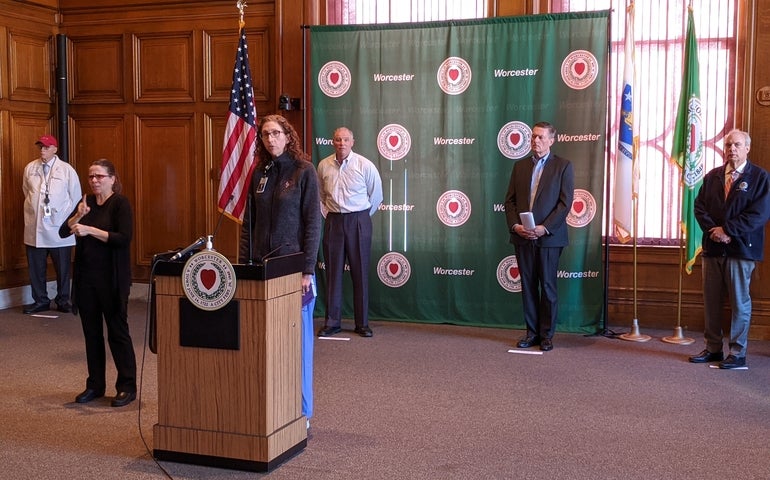Healthcare leaders in Central Massachusetts have seen a lot during the coronavirus pandemic, and plenty to make them feel both optimistic and concerned.
Front-line workers have dealt with a contagious and deadly disease and seen numbers of deaths they’ve never experienced, while others have been redeployed or juggled working at home with new family obligations. Many might suffer from post-traumatic stress and other harms from what they’ve gone through.
But health agencies quickly switched many other services to telehealth, which allowed them to care for patients remotely. Health systems that are normally competitors joined together to find ways to best treat the peak of the pandemic.
“I’m not sure that anything remained the same,” said Dr. Tarek Elsawy, the president and CEO of Reliant Medical Group, which has outpatient medical offices across Central Massachusetts.
Elsawy and three other health care leaders joined an online forum hosted by the Worcester Business Journal on Thursday: UMass Memorial Medical Center President Dr. Michael Gustafson, Saint Vincent Hospital CEO Carolyn Jackson, and Fallon Health President and CEO Richard Burke.
Together, their health systems and others have been dealing with a pandemic that’s killed 600 people in Worcester County and more than 6,000 across Massachusetts. The state has had roughly 90,000 cases, one of the hardest hit in the country.
UMass Memorial and Saint Vincent joined together to help create a field hospital at Worcester’s DCU Center, which UMass Memorial managed. Reliant opened a temporary observation unit at its ReadyMED urgent care site on Shrewsbury Street in Worcester, and Fallon created a coronavirus care unit at one of its elder care centers in Worcester.
The healthcare leaders said they were encouraged by the ability of workers to quickly make care and staffing changes that otherwise would have taken far longer. UMass Memorial and Saint Vincent converted intensive care units to those dedicated to coronavirus patients, for example, and Fallon allowed for early prescription renewal and waived copayments for telehealth and coronavirus care.
At times, the pandemic has been particularly brutal for front-line staff. For weeks, UMass Memorial, for example, didn’t let any loved ones visit coronavirus patients nearing death out of caution for spreading the virus. Many health providers were the only ones with patients in the last moments of their life, Gustafson said.
“A lot of caregivers said that was the hardest thing they ever had to do,” he said.
UMass Memorial is working to make a range of services available to health providers, Gustafson, whether it be for those looking for holistic care or those looking to connect with peers or professional therapists.
Hospitals have used technology in ways they hadn’t before. Saint Vincent, for example, used high-resolution baby monitors to watch and keep contact with coronavirus patiens without having to don protective equipment and enter their room. UMass Memorial gave patients wearable monitors so staff could remotely monitor oxygen levels, heart rates and other vital signs.
Leaders said they were uplifted by collaboration between different entities to deal with the crisis.
“Calls we made to other health leaders in the area — the ability of all of us to work together is something that’s really — it doesn’t surprise me, but it’s really heartening,” Elsawy said.

